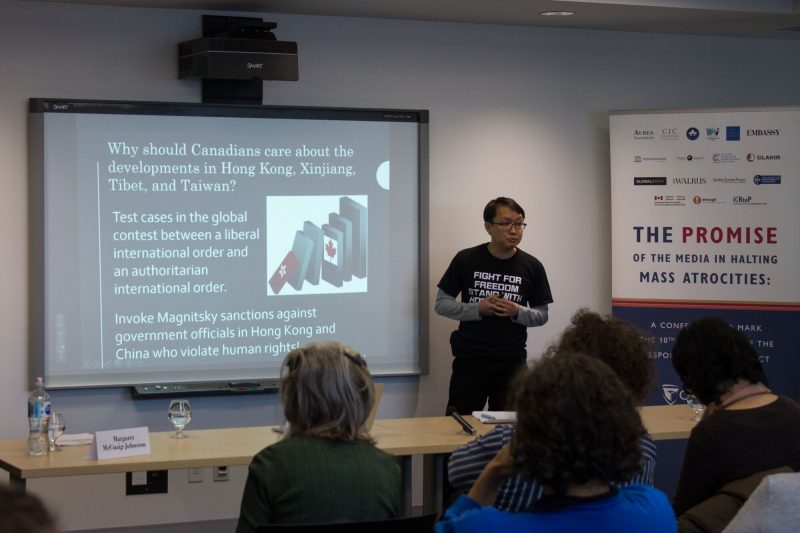A panel on China’s human rights violations was held in Concordia University’s Faubourg building on Jan. 15.
The experts, who were invited by the Montreal Institute for Genocide and Human Rights Studies (MIGS), expressed concerns about the Uyghur Muslim concentration camps in Xinjiang, an autonomous region in Western China. They also discussed the brutal repression in Hong Kong and Tibet, as well as China’s increasing influence on the Western world and its implication for the future of democracy.
The event took place just days after Human Rights Watch (HRW) executive director Kenneth Roth was denied entry into Hong Kong and HRW’s launch event for its World Report 2020 was disrupted by protestors, according to MIGS executive director Kyle Matthews.
“Human rights issues in China are nothing new,” said speaker Margaret McCuaig-Johnston, Senior Fellow at both the University of Ottawa’s Institute for Science, Society and Policy and the University of Alberta’s China Institute. She listed historical events such as the Cultural Revolution, the Xidan Democracy Wall, and the Tiananmen Square Massacre which she said “trampled on individual human rights in a myriad of ways.”
McCuaig-Johnston continued to explain that although China has lifted more than 800 million people out of poverty since 1978, this is not the same as ensuring individual human rights. She described how the Chinese Communist Party (CCP) uses detention as a pressure tactic against dissidents and the abusive conditions under which they are detained, which were revealed by HRW’s interviews with former prisoners. She also explained the social credit system, in place since 2014, and the CCP’s widespread interference in Western countries.
Both McCuaig-Johnston and Benjamin Fung, a Canada Research Chair in Data Mining for Cybersecurity and an Action Free Hong Kong Montreal activist, highlighted the CCP’s infiltration in Canadian academics and described the pressure on faculty and Chinese students to self-censor criticism of the Chinese government.
The CCP’s use of technology, such as facial and voice recognition for repression, was also extensively discussed by both experts. Fung additionally focused on Chinese companies’ goal to expand the 5G network––he explained that the CCP controls every large corporation in China and that technology companies are obligated to cooperate with Chinese intelligence units.
“It’s about trust, you trust Apple to update your iPhone because it is a private company,” Fung explained, adding that we cannot trust Chinese companies who would introduce malware into the 5G network if the CCP asked them to.
Fung also spoke in detail about China’s one country, two systems policy and the CCP’s broken promise: its decision to maintain control over Hong Kong’s government instead of allowing universal suffrage, which Fung asserts was promised in the 1984 Sino-British Joint Declaration. He described what he called an ongoing humanitarian crisis and a system of police brutality, lengthy prison sentences, sexual assault, and white terror––attacks on pro-democracy activists.
The situation in Tibet was discussed by Sherap Therchin, executive director of the Canada-Tibet Committee, who explained it has been 70 years since China illegally invaded Tibet, and the Western world seems to have forgotten about it. He described the CCP’s reflexive control strategy: how they have been feeding manufactured information about Tibet to target groups so consistently that the Western world now believes their narrative that Tibet was historically part of China.
Therchin continued to explain that in the Western world’s eyes, control over Tibet is now an internal issue––a problem for China to deal with without Western influence.
Finally, Dilmurat Mahmut, a Ph.D. candidate at McGill University’s Faculty of Education, talked about the Uyghur re-education camps in place since 2017. According to documents obtained through an investigation by the International Consortium of Investigative Journalists, an estimated 1 million Uyghur Muslims are detained in these camps, but Mahmut said these numbers could be as high as 3 million. He explained the history of the region of Xinjiang, originally East Turkistan, and the CCP’s labeling of all Turkic Muslims in the region as potential terrorists or pre-criminals.
Mahmut described the conditions in what the CCP calls vocational training centres, and explained that Uyghur children are being forcibly detained and sent to state-run orphanages where they are forbidden from learning the Uyghur language and, instead, only learn the Chinese culture—he called this cultural genocide. Mahmut finished his presentation with a warning from Roth on the dangers of not challenging Chinese human rights abuses and worldwide interference.
Photos by Brittany Clarke
